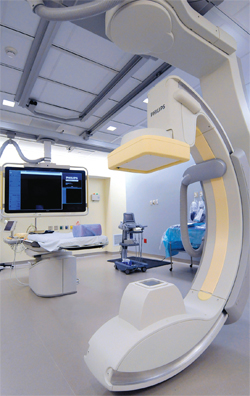 Vascular and Interventional Radiologists use imaging, like X-rays, to see inside a patient’s body, pinpoint where the problem is and map out how to get there without a surgical operation. These highly skilled physicians use a very small incision in the skin to guide catheters or other instruments through the vascular system, urinary tract, or gastrointestinal tract, in a minimally invasive manner to treat disease directly at the source, or to take tissue samples for analysis.
Vascular and Interventional Radiologists use imaging, like X-rays, to see inside a patient’s body, pinpoint where the problem is and map out how to get there without a surgical operation. These highly skilled physicians use a very small incision in the skin to guide catheters or other instruments through the vascular system, urinary tract, or gastrointestinal tract, in a minimally invasive manner to treat disease directly at the source, or to take tissue samples for analysis.
What are the advantages of Interventional Radiologic (IR) procedures?
While no treatment is risk free, the risks of IR procedures can be far lower than the risks of open surgery.
The specific advantages are:
- No large incisions.
- Since there is no open surgery, there are no large scars following the procedures.
- Minimally invasive procedures have a lower risk of complications than open surgical procedures.
- Many procedures can be performed on an outpatient basis or via short hospital stay.
- Patients rarely require general anesthesia; typically sedation and pain medication are given to make the patient comfortable during the procedure.
- Recovery time is often significantly reduced.
How is the VIR service unique at Westchester Medical Center?
Westchester Medical Center has the largest and the most advanced vascular interventional radiology service in the Hudson Valley. Our VIR service is staffed by a team of highly qualified, dedicated nurses and technologists that provide outstanding care to our patients before, during and immediately after procedures. Experienced Radiology Physician Assistants provide clinical support to our Vascular and Interventional Radiologists. Our newly renovated IR suite features advanced equipment and procedure rooms, and a six-bed holding area, all combined in a patient-friendly environment. Our IR team is available 24 hours a day, 365 days a year to provide the most advanced interventional services including emergent Trauma support for the Hudson Valley.
What to expect during an IR procedure at WMC?
Patients are required to have current lab tests,
as per IR specifications. After patient arrival
in the IR Unit, an Interventional Radiologist or
a Physician Assistant will come to speak
with the patient, discuss the procedure,
answer any questions the patient may have and
obtain the patient’s permission for the procedure.
The patient will then be prepped for the exam and
taken to the IR suite for the procedure.
Following the procedure, the patient will return
to the nursing area for recovery. The time
for recovery varies based on the procedure.
The patient is then discharged from Interventional Radiology.
The following are some of the procedures routinely performed by VIR:
- Uterine fibroid embolization, a non-operative treatment of women with fibroids.
- Pelvic Congestion Syndrome for chronic pelvic pain in women
- Varicocele embolization, a non-operative treatment of varicocele.
-
Treatment of liver tumors, by Yttrium 90(Injection of radioactive
beads into the blood vessel supplying the tumor), Chemoembolization (injection
of beads loaded with chemotherapeutic agents directly into the blood vessel
supplying the tumor) and by percutaneous ablation (such as destroying the tumor
with microwave probe).
- Complete hemodialysis access service, with declotting and repairing grafts, and veins, in order to prolong the functional life of accesses.
- Placement and maintenance of short- and long-term catheters and ports into the venous system for injection of medications, intravascular nutrition and hemodialysis.
- Liver biopsy, percutaneous and via the jugular vein to decrease the risk of bleeding in patients with poor clotting.
- Percutaneous needle biopsies of the neck, thyroid, chest, lungs, abdominal organs, bones and soft tissues.
- Vena Cava Filter placement (to prevent traveling of life-threatening blood clots to the lungs–pulmonary embolism) and retrieval of the device when it is no longer needed.
- Porto-systemic shunting (TIPS), for treatment of patients with complications (e.g., ascites or variceal bleeding) of chronic liver disease.
- Hepatobiliary procedures for bile duct obstruction, post liver transplant complications.
Schedule Your Appointment By Phone
The scheduling staff is available Monday through Friday from 9:00 am - 5:00 pm. Please have your prescription and Insurance Information available.
Vascular and Interventional Radiology: 914.493.7560
Click Below to Schedule Your Appointment Online:
Make an Appointment.